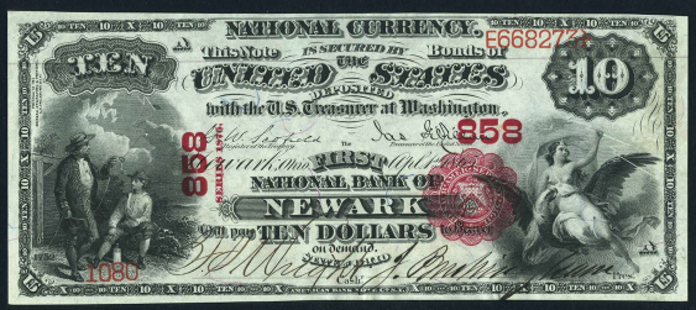Ten Dollar Notes › Nationals › 1875 Ten Dollar National Bank Notes › Iowa Charters › 1875 $10 Grinnell Iowa First National Bank
Get Value Now
| Item | Info |
|---|---|
| Series | 1875 |
| Charter | #1629 First National Bank of Grinnell, Iowa |
| Year Chartered | 1866, 39 Banks Chartered |
| City Info | Grinnell is a city in Poweshiek County, Iowa, United States. The population was 9,218 at the 2010 census. Grinnell was founded as a "Yankee" settlement, that is to say it was founded and originally settled by settlers from New England who were descended from the English Puritans who settled New England in the 1600s. Grinnell was founded in 1854 by Josiah B. Grinnell a Congregationalist from Vermont. The city was originally slated to be named "Stella," but J.B. Grinnell convinced other members of the colony to adopt his own name for the city, citing it as a rare and concise name. Grinnell was incorporated on April 28, 1865, and by 1880 Grinnell had a population of around 2000. Located at the junction of two railway lines, it became and remains the largest community in Poweshiek County. Source: Wikipedia |
| Similar Cities | City name is unique, no others like it. |
| Seal Varieties | Red with scallops |
| See Also | If your note doesn't match try: 1. 1882 $10 National Bank Notes 2. 1875 $10 Legal Tender 3. 1878 $10 Legal Tender 4. 1880 $10 Legal Tender |
| Other Info | 1. Value depends on notes known for charter, condition and market demand. |
| Neat Fact | Plate letters A-C for $10 Notes, A for $20 Notes (Friedbergs, 20th Ed. P 99) |
No Obligations Offers and Appraisals
Please submit a good photo or scan. It will be identified and evaluated. Understand there may be subtle differences between the image you see above and your note. Signatures, design, markings and note condition will determine the offer price. Notes in Uncirculated or better condition receive the best offers.
Appraisals can be estimated for wholesale and retail prices. Wholesale is what dealers typically pay. Retail is what a collector might pay. Retail is slightly higher in most cases.
Please visit this page for USA Paper Money Reference. Do not treat this page as a reference guide, it is for appraisal and acquisition purposes only.
